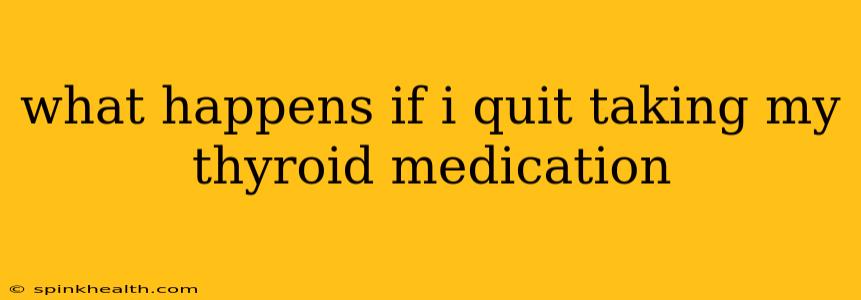What Happens If I Quit Taking My Thyroid Medication? A Story of Hormonal Harmony (and What Happens When It's Disrupted)
Let's be honest, remembering to take medication daily can be a challenge. But when it comes to thyroid medication, skipping even a single dose can have significant consequences. Think of your thyroid as the conductor of your body's orchestra – it keeps everything running smoothly. When that conductor is missing, the whole symphony goes out of tune.
My name is Dr. Eleanor Vance, and for over two decades, I've witnessed firsthand the impact of thyroid medication on patients' lives. This isn't just about a pill; it's about the delicate balance of hormones that affect every cell in your body. So, let's explore what happens when you stop taking your thyroid medication, and why consistency is key.
What are the immediate effects of stopping thyroid medication?
Imagine your body suddenly deprived of the vital hormones it needs to function optimally. This is what happens when you abruptly stop taking your thyroid medication. The effects can be surprisingly swift and vary depending on factors like the severity of your hypothyroidism, the dosage you were on, and your individual body's response. You might experience a gradual return of symptoms, or a more sudden and dramatic shift.
Some immediate consequences can include:
- Fatigue: An overwhelming tiredness that lingers even after a full night's sleep.
- Weight gain: A slowing of metabolism can lead to unexpected weight increase.
- Constipation: Digestive sluggishness is a common complaint.
- Depression: Hormonal imbalances can significantly impact your mood.
- Cognitive difficulties: This can range from mild brain fog to more pronounced memory issues and difficulty concentrating.
- Cold intolerance: Feeling the cold much more intensely than usual.
- Muscle weakness and aches: A lack of thyroid hormones can affect muscle function.
It's crucial to understand that these are just potential effects; everyone experiences things differently. The severity of the symptoms depends on several individual factors.
What are the long-term effects of stopping thyroid medication?
Stopping your medication isn't just about immediate discomfort; long-term consequences can be far more serious. Prolonged hypothyroidism, left untreated, can lead to:
- Goiter: An enlargement of the thyroid gland.
- Myxedema Coma: A rare but life-threatening complication characterized by severe hypothyroidism. This requires immediate medical attention.
- Heart problems: Hypothyroidism can affect heart rate and rhythm.
- Infertility: Hormonal imbalances can affect reproductive health.
- Increased risk of cardiovascular disease: Untreated hypothyroidism can increase the risk of serious heart issues.
- Osteoporosis: A lack of thyroid hormone can affect bone density, increasing the risk of fractures.
These long-term complications underscore the importance of consistent medication.
Can I stop taking my thyroid medication if my symptoms improve?
Absolutely not! Many patients report feeling better after starting medication, but that doesn't mean their thyroid is fully healed. Stopping treatment prematurely can lead to a relapse of symptoms and, as we've discussed, potentially more severe health issues. Your doctor will carefully monitor your progress and adjust your medication as needed to ensure your thyroid hormone levels remain within the optimal range. Improvement in symptoms is often a sign of successful treatment, not an indication to discontinue it.
What should I do if I'm having trouble remembering to take my medication?
Medication adherence can be challenging, but there are several things you can do:
- Set reminders: Use phone alarms, pill organizers, or even sticky notes.
- Establish a routine: Take your medication at the same time each day.
- Ask for help: Talk to your doctor or pharmacist about strategies to improve adherence.
- Find an accountability partner: Ask a family member or friend to help you remember.
What should I do if I miss a dose of my thyroid medication?
If you miss a dose, take it as soon as you remember, unless it's almost time for your next dose. Never double up on your medication. If you're frequently forgetting doses, it's important to address this issue with your doctor or pharmacist.
In conclusion, stopping your thyroid medication without consulting your doctor can have serious repercussions. Maintaining a consistent medication regimen, under the guidance of your healthcare provider, is vital for managing your condition and preventing potentially life-threatening complications. Open communication with your doctor is key to successfully managing your thyroid health. Remember, consistency is crucial in maintaining the harmony of your hormonal orchestra.

